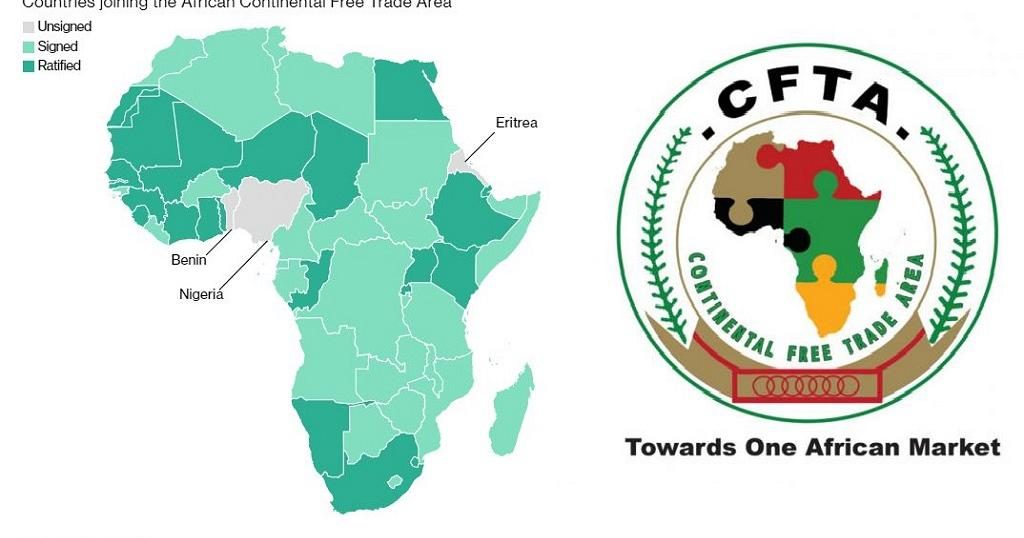President Muhammadu Buhari, Wednesday, said Nigeria would be guided by ‘‘national interest’’ in taking any decision on the agreement establishing the African Continental Free Trade Area, AfCFTA.
Some months ago, Nigeria delayed signing the agreement because it wanted time to consult with key stakeholders in the country. This includes the Nigerian labour congress, the manufacturers association as well as other players in the private sector.
This is as Buhari noted that Nigeria lacks the capacity to stop countries within the African Union, AU, from dumping goods which would be detrimental to industries in the country.
Receiving National Council of the Manufacturers Association of Nigeria, MAN, led by its president, Engr Mansur Ahmed, at the Council Chamber, Presidential Villa, Abuja, Buhari said he was ready to receive the report of a committee set up to assess the potential costs and impact of signing the agreement establishing the AfCFTA for Nigeria.
The Presidential Steering Committee on AfCFTA Impact and Readiness Assessment Committee was inaugurated on October 22, 2018, with the mandate to assess the extent to which Nigeria was ready to join the agreement, and what the impact of doing so would be.
The committee was initially given 12 weeks to conclude its assignment, after holding wide consultations with industry groups and stakeholders, including MAN.
The President in a statement by Femi Adesina, his Special Adviser on Media and Publicity, told National Council of Man that AfCFTA was on the agenda for the upcoming AU Summit in Niamey, Niger Republic, in July.
He said: ‘‘I don’t think Nigeria has the capacity to effectively supervise and to ensure that our colleagues in AU don’t allow their countries to be used to dump goods on us to the detriment of our young industries and our capacity to utilize foreign exchange for imported goods.”
President Buhari also promised to look into the presentation by MAN highlighting issues of concern to the manufacturing sector, namely AfCFTA, Export Expansion Grant and other incentives, challenges with the 2019 fiscal policy measures, recent increase in NAFDAC charges, the Industrial Development (Income Tax Relief) (Amendment) Act, 2019, among others.
‘‘I assure you that I know the enormity of our problems in terms of population growth rate and teeming young people.
‘‘We need to move very fast, and the government will try and encourage you as much as possible so that the problem of unemployment and the provision of other services relative to our population and state of development can be tolerated,” President Buhari said.
Countries that have signed the AfCFTA consolidated text include Niger, Rwanda, Angola, C.A.R., Chad, Comoros, Congo, Djibouti, The Gambia, Gabon, Ghana, Kenya, Mauritania, Mozambique, Cote’d’Ivoire, Seychelles, Algeria, Equatorial Guinea.
Others are Morocco, Swaziland, Benin, Burkina Faso, Cameroon, Cape Verde, D.R.C, Guinea, Liberia, Libya, Madagascar, Malawi, Mali, Mauritius, South Sudan, Uganda, Egypt, Ethiopia, Sao Tome and Principle, Togo and Tunisia.
Earlier in his remarks, the MAN president, Mansur Ahmed, had outlined some credible policies that had driven the economy forward in the first term of President Buhari.
Ahmed, who commended the Buhari administration for consistent efforts to sustain the growth trajectory anchored on improving the business environment, appreciated the government’s efforts at improving the Ease of Doing Business Project, fight corruption, focus on poverty reduction, job creation and inclusive growth as well as the launch of the Economic Recovery and Growth Plan, ERGP.
He, however, noted that despite the significant progress recorded in the last four years, it was clear that the economy was still fragile.’
‘‘With the GDP at 2.0 per cent and below the population growth rate, the clouds are still threatening and the task of driving the economy upwards is still enormous.
‘‘But Your Excellency we are encouraged by the very strong commitment you expressed only last week in your Democracy Day address.
‘‘You did say that in your second term, your administration will do, even more, not only to continue to drive the economy on the path of sustained growth but also, indeed, to create a more inclusive and sustainable economy,” he said.

